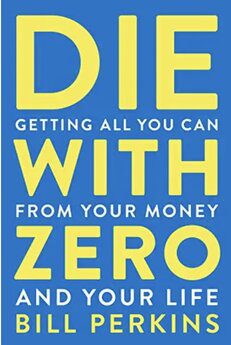Everyone’s health generally declines with time, and sooner or later we all die, so the question we all must answer is how to make the most of our finite time on earth.
In Die With Zero: Getting All You Can from Your Money and Your Life, American hedge fund manager and author Bill Perkins presents a practical guide on how to get the most out of your money—and out of your life.
Die With Zero Book Premise
You should be focusing on maximizing your life enjoyment rather than on maximizing your wealth. Those are two very different goals. Money is just a means to an end: Having money helps you to achieve the more important goal of enjoying your life. But trying to maximize money actually gets in the way of achieving the more important goal.
By aiming to die with zero, you will forever change your autopilot focus from earning and saving and maximizing your wealth to living the best life you possibly can.
Why wait until your health and life energy have begun to wane? Rather than just focusing on saving up for a big pot full of money that you will most likely not be able to spend in your lifetime, live your life to the fullest now: Chase memorable life experiences, give money to your kids when they can best use it, donate money to charity while you’re still alive. That’s the way to live life.
“ In the end, the business of life is the acquisition of memories.”Bill Perkins: “Am I telling you to blow all your money before 60? No.”
You’ll definitely need income when you’re older, too—so while you’re still working to earn money, you’d better save for that time in your life when you’ll no longer be working. Just realize that time moves in only one direction and that as it passes it sweeps away opportunities for certain experiences forever. If you keep that in mind as you plan your future, you’ll be more likely to make the best use of every year of time in your life.
Rule No. 1: Maximize your positive life experiences.
Death wakes us up
Death wakes people up, and the closer it gets, the more awake and aware we become. When the end is near, we suddenly start thinking, What the hell am I doing? Why did I wait this long? Until then, most of us go through life as if we had all the time in the world.
Some of that behavior is rational. It would be foolish to live every day as if it were your last: You wouldn’t bother to work, or study for a test, or visit the dentist. So it makes sense to delay gratification to some extent, because that pays off in the long run. But the sad truth is that too many people delay gratification for too long, or indefinitely. They put off what they want to do until it’s too late, saving money for experiences they will never enjoy. Living as if your life were infinite is the opposite of taking the long view: It’s terribly shortsighted.
Maximizing your fulfillment from experiences—by planning how you will spend your time and money to achieve the biggest peaks you can with the resources you have—is how you maximize your life. By taking charge of these crucial decisions, you take charge of your life.
Life is not a game of Space Invaders—you don’t get points for all the money you rack up in the game—but many people treat it as though it were. They just keep earning and earning, trying to maximize their wealth without giving nearly as much thought to maximizing what they get out of that wealth—including what they can give to their children, their friends, and the larger society now, instead of waiting until they die.
Consumption Smoothing.
Our incomes might vary from one month or one year to another, but that doesn’t mean our spending should reflect those variations—we would be better off if we evened out those variations. To do that, we need to basically transfer money from years of abundance into the leaner years.
Your Life Is the Sum of Your Experiences: Memory Dividend
Many psychological studies have shown that spending money on experiences makes us happier than spending money on things. Unlike material possessions, which seem exciting at the beginning but then often depreciate quickly, experiences actually gain in value over time.
Movement is Life
All living things, including humans, are energy-processing units. We process food so we can power our bodies. Processing energy lets us not only survive on earth but also live a potentially fulfilling life: With that energy, we can move about the world.
Movement is life, and as we move we get continuous feedback—which leads to discovery, wonder, joy, and all the other experiences you can have throughout life’s great adventure. When you are no longer able to process energy, you will be declared dead and your adventure will be over.
Rule No. 2: Start investing in experiences early.
The main idea here is that your life is the sum of your experiences. This just means that everything you do in life—all the daily, weekly, monthly, annual, and once-in-a-lifetime experiences you have—adds up to who you are. When you look back on your life, the richness of those experiences will determine your judgment of how full a life you’ve led.
You retire on your memories
When you’re too frail to do much of anything else, you can still look back on the life you’ve lived and experience immense pride, joy, and the bittersweet feeling of nostalgia.
Life Experience Metaphor
We build a well, they get a pump, and as the pump pumps water into a cup, the cup quickly fills, so the water starts overflowing. They take a sip and they keep pumping. And at the end of their lives, after a lifetime of pumping, they see that they’re still thirsty. What a waste! Imagine the regret you would feel if you got to the end of your days only to realize you haven’t managed to live a life full of satisfying experiences.
Positive experiences are radioactive and contagious in a good way; they start a chain reaction that releases more energy than you thought you had.
Return on equity vs experience
Earning and earning while forgetting that your whole point in earning money is to be able to spend it on the experiences that make your life what it is.
When you ask people what they’re saving money for, much of the time the answer is “retirement.” To some extent, I get it: We all need to save and invest some amount of money for a time when we’re no longer getting a paycheck. Nobody wants to starve in their old age or make their children have to support them. But here’s the thing: Since the whole point of money is to have experiences, investing money to get a return with which to have experiences is a roundabout way of having experiences.
Why go through all that when you can just invest directly in experiences—and get a return on experiences? Not only that, but the number of actual experiences available to you diminishes as you age. Yes, you need money to survive in retirement, but the main thing you’ll be retiring on will be your memories—so make sure you invest enough in those.
Rule No. 3: Aim to die with zero.
Research on people’s actual retirement spending shows that spending isn’t constant, and often declines in later years. If you don’t want to squander your life energy, you should aim to spend all your money before you die.
Not to reach zero before you die, which would leave you high and dry, but to have as little as possible left unused for all the time and energy you spent working to earn that money.
Optimizing across your whole life takes a lot of thought and planning; it’s easier to live for short-term rewards (myopia) and to stay on autopilot (inertia) than to do what will be good for you in the long term.
go-go years, slow-go years, and no-go years.
Experts in retirement planning even have some lingo for this consumption pattern: go-go years, slow-go years, and no-go years. The idea is that when you’re first retired, you’re raring to have all those experiences you’ve been putting off until retirement, and you still (for the most part) have the health and energy to pursue those experiences. Those are your go-go years. Later on, typically in your seventies, you begin to slow down as you cross items off your bucket list, and your health declines. And later still, in your eighties or beyond, you don’t have a whole lot of “go” left at all, no matter how much money you still have.
Rule No. 4: Use all available tools to help you die with zero.
Annuities vs Life Insurance
Life insurance—it helps you deal with mortality risk, and 60 percent of Americans own at least some life insurance. What fewer people realize is that there are financial products designed to deal with longevity risk, too. Since many people are fearful of running out of money before they pass on, there is one product that they should definitely look into.
These products are called income annuities (or simply annuities). Annuities are essentially the opposite of life insurance: When you buy life insurance, you’re spending money to protect your survivors against the risk that you’ll die too young, whereas buying annuities protects you against the risk of dying too old (outliving your savings). The goal of annuities is to insure you against the risk of outliving your money.
How do they achieve that goal? Well, buying an annuity means you give the insurance company a lump sum—say, $500,000 at age 60—and in return you get a guaranteed monthly payout (for example, $2,400 each month) for the rest of your life, however long that happens to be.
If you live your life with fear and avoidance, my bet is you will either fritter your money away or play it so safe that you will leave many, many years of your hard-earned money behind—so you’ll be working many years as a slave to your own fears.
The Fear of Death
People are irrational about death even when they are not close to death. That’s why they have outsize fears of running out of money before they die—big enough to compel many people to oversave for the distant future and, as a result, fail to enjoy their present as much as they could.
Death and deterioration are real for everyone, so the date of your death in the future should affect what your behavior is now.
Rule No. 5: Give money to your children or to charity when it has the most impact
The Problem with Inheritance
This is the problem with inheritances: You’re leaving too much to chance. Remember, life can be extremely fickle. Regardless of the amount you’re passing on, it takes a great deal of luck for it to arrive exactly when each of your recipients needs the money most. Much more likely, the money will arrive too late for it to have maximum impact on the recipient’s quality of life.
Your Real Legacy Isn’t Money
Of all the experiences you are trying to bequeath to your child, one of those experiences is time with you. Time with you is crucial, because the memories your kids have of you have lasting effects, for better or worse. Scientists have known for some time that young adults who as young children receive more affection from their parents come to enjoy better personal relationships in general and to also have lower rates of substance abuse and depression.
The purpose of money is to have experiences, and one of those experiences for your kids is time with you. Therefore, if you are earning money but not having experiences with your kids, you are actually depriving your kids. And yourself.
Rule No. 6: Don’t live your life on autopilot.
As you get older, your health declines and your interests gradually narrow, just as your sex drive diminishes. Your creativity usually declines, too. And when you’re extremely old and frail, no matter what your level of interest is, just about all you can do is sit and eat tapioca pudding. At that point, money is useless to you, because all you need or want is to lie in bed and watch Jeopardy. This was my conclusion: The utility, or usefulness, of money declines with age.
It makes sense to spend more of your money at some ages than others, so it makes sense to adjust your balance of spending to saving over the years accordingly.
- Young people tend to have abundant health and a good deal of free time, but they don’t usually have a lot of money.
- Retirees in their sixties, seventies, and beyond—the other end of the spectrum—have abundant time (and often more money than young people), but, unfortunately, they have less health, and thus a diminished ability to enjoy the time and money they do have than the young do.
To get the most positive life experiences at any age, you must balance your life, and this requires you to exchange an abundant resource in order to get more of a scarce one.
Rule No. 7: Think of your life as distinct seasons.
Just realizing that they don’t last forever, that everything eventually fades and dies, can make you appreciate everything more in the here and now.
This entire book is predicated on the hard, cold truth that we will all die and, as we age, our health will gradually decline. But there’s another, less obvious truth about “dying” that has important implications for how you should live your life: We all die a multitude of deaths throughout our lives.
Regret-Free Living
Sometimes people realize their mistake just before the window of opportunity closes—like when one’s children are getting ready to leave the nest—and sometimes the recognition comes when it’s too late to do anything at all about it except resolve to do better in their next life stage.
The saddest, though, is when the realization doesn’t hit until you’re facing your own mortality, when it really is too late to change anything and all you can do is make peace with your past.
Being aware that your time is limited can clearly motivate you to make the most of the time you do have.
In short, when something feels abundant and endless, the truth is, we don’t always value it. But the reality, of course, is that the time you get to spend in each phase in your life is not that abundant, and it’s certainly not unlimited.
Time Bucket vs Bucket List
Bucket List
Typically a single accounting of all the things you hope to do before you “kick the bucket,” so to speak. The more traditional bucket list is usually put together by an older individual who, when confronted with their mortality, begins to scratch out a list of activities and pursuits they not only haven’t done yet but now feel compelled to do quickly, before time runs out.
Time Bucket
By contrast, by dividing goals into time buckets, you are taking a much more proactive approach to your life. In effect, you’re looking ahead over several coming decades of your life and trying to plan out all the various activities, events, and experiences you’d like to have. Time buckets are proactive and let you plan your life; a bucket list, on the other hand, is a much more reactive effort in a sudden race against time.
Rule No. 8: Know when to stop growing your wealth.
Invest in experiences that yield long-lasting memories, always bear in mind that everyone’s health declines with age, give your money to your children before you die instead of saving for their inheritance, and learn to balance current enjoyment with later gratification.
Our culture’s focus on work is like a seductive drug. It takes all of your yearning for discovery and wonder and experiences, promising to give you the means (money) to get all those things—but the focus on the work and the money becomes so single-minded and automatic that you forget what you were yearning for in the first place. The poison becomes the medicine—that’s nuts!”
The amount of money you’ll need in retirement is often a lot lower than what you’ve been advised to save.
Rule No. 9: Take your biggest risks when you have little to lose.
Asymmetric Risk
when the upside of possible success is much greater than the downside of possible failure. When you face asymmetric risk, it makes total sense to be bold, to grab the opportunity at hand. At the extreme, when the downside is very low (or nonexistent, as in the “nothing to lose” case) and the upside is really high, it’s actually riskier not to make the bold move. The downside of not even taking a chance is emotional: potentially a lifetime of regret and wondering What if? The upside of taking a chance always includes emotional benefits—even if things don’t work out.
People are more afraid of running out of money than wasting their life, and that’s got to switch. Your biggest fear ought to be wasting your life and time, not Am I going to have x number of dollars when I’m 80?
All the best in your quest to get better. Don’t Settle: Live with Passion



Comments are closed.